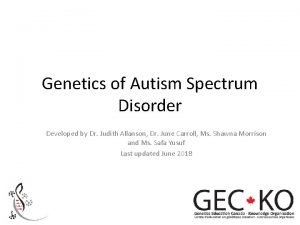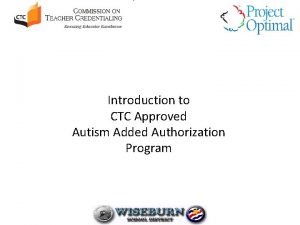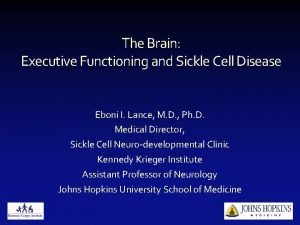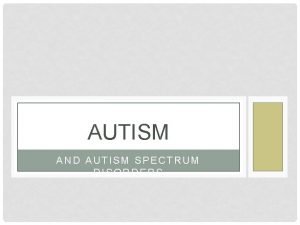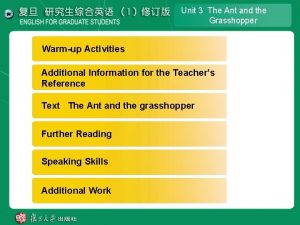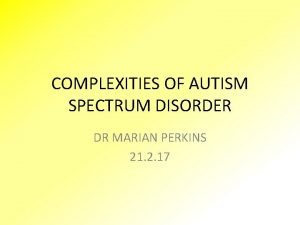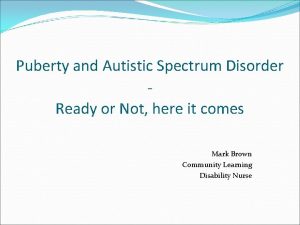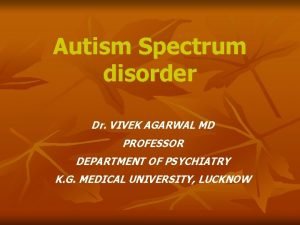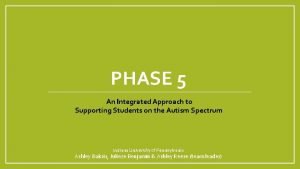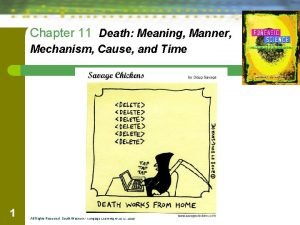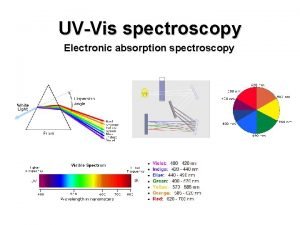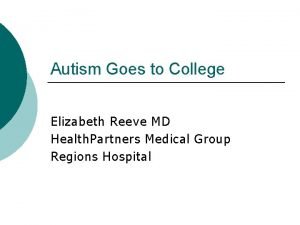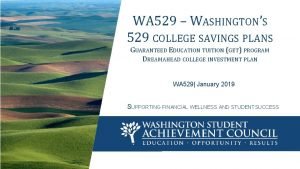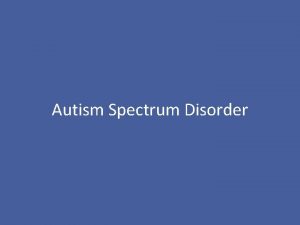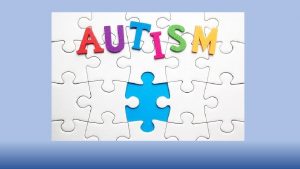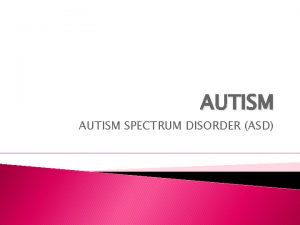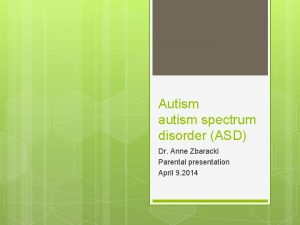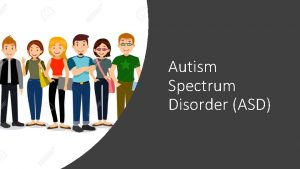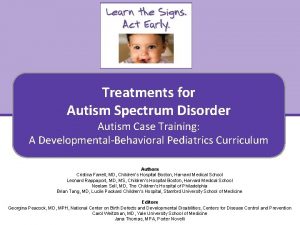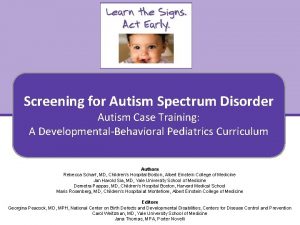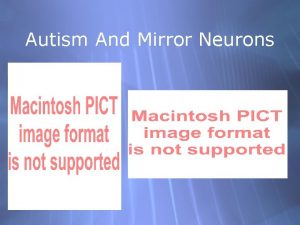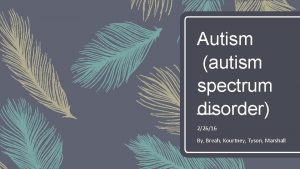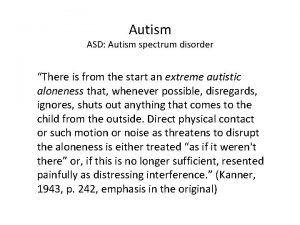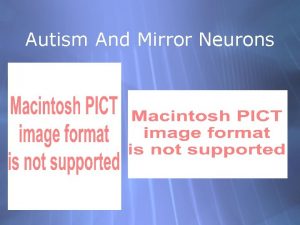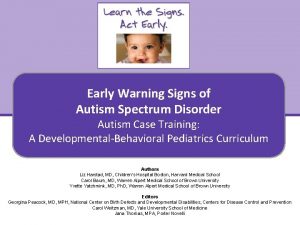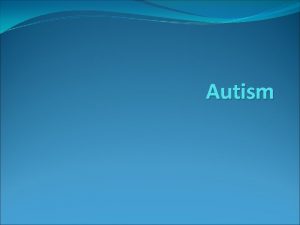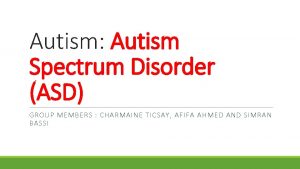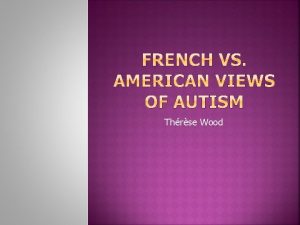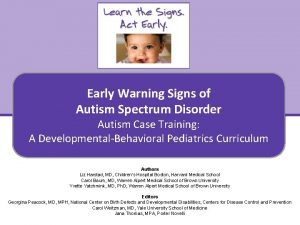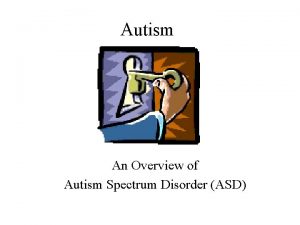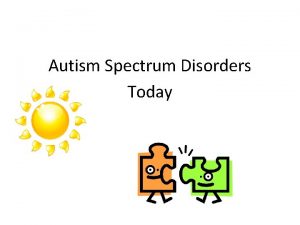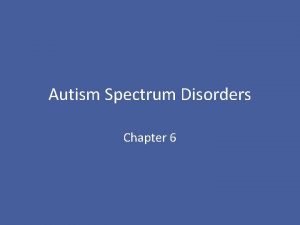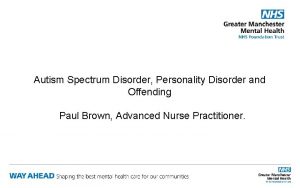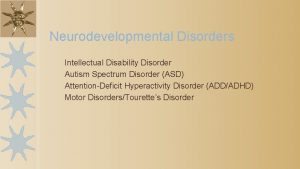Realizing the College Dream with Autism Spectrum Disorder






















































- Slides: 54

Realizing the College Dream with Autism Spectrum Disorder Focus on Family and Disability Seminar Ann Palmer www. annpalmerautism. com ann. palmer@cidd. unc. edu

Why I Am Here



Overview of Presentation Discuss strategies for preparing the student (and parents) for the transition to Higher Education n Review the laws protecting college students with disabilities n Describe common challenges for college students with ASD or other learning differences n Discuss strategies that may help n

Preparing for the Transition. Students AND Parents Understand differences between HS and college n Understand differences in laws protecting students n Consider all options for Higher Education n Recognize importance of functional skills n Recognize importance of self-advocacy skills n

Letting Go n n n Fear Sadness Inadequacy Guilt Protectiveness n n Confusion Desperation Anger Hopefulness

Transition Plan under IDEA Required at age 16, age 14 in NC n If transition issues will be discussed, student MUST be invited to attend n Should cover “movement from school to post-school activities”- post-secondary education, vocational education, supported employment, independent living, and adult services n Invite people who care about the future of the student n

Preparing for Transition Accept that living forever is not a viable transition plan n Envision the future- parent’s vision and student’s vision n Get advice from other parents and professionals n Create practical and useful IEP/ITP goals n Balance academics and functional skills n

Functional Skills n Independent Living n n Personal Hygiene n n Will the student be able to live in the community? What level of help will they need? Can student independently take care of their self- care needs? What skills do they need to work on? Communication n Can student answer the phone, e-mail, make appointments? Can the student initiate asking for help? Are they able to report information?

Functional Skills n Financial n n Transportation n n Can the student use money in a functional way? Can they follow a budget? How will the student get around as an adult? Do they know how to access public transportation? Vocational n What work skills does the student need to do their dream job? How are their interpersonal skills? How much assistance will they need in

Differences Between High School and College n High School Strict mandated class schedule- 30 hrs/wk n Frequent reminders by teachers n Teachers check on understanding n School is required to serve student n n College Student makes own schedule, 15 hrs/wk n Student has to keep track of assignments n Student expected to initiate asking for help n Student must meet academic criteria n

Options of Higher Education n Different kinds of schools Community Colleges and Technical Schools n 2 year and 4 year Colleges n n Special support programs for students with disabilities www. collegeautismspectrum. com/collegeprograms. html Part-time versus full-time n Virtual classes- on-line, video n Commuting versus living on campus n

Options for Students with ID/DD in NC n Community College Programs Alamance- Career College n Central Piedmont- Community Transitions and Project SEARCH n Cleveland- Connexions n Randolph- Career College n Western Piedmont- Accessible College Experience n College of The Albemarle- Pathways to an Accessible College Experience n

Options for Students with ID/DD in NC n College and University Programs Appalachian State University- Scholars with Diverse Abilities Program n University of North Carolina Greensboro. Beyond Academics n Western Carolina University- University Participant Program n * http: //www. cidd. unc. edu/psea/

Important Considerations When Choosing a School/Program Location of school n Size of school n Curriculum of interest to student n Cost n Experience with ASD n Level of supports available n

Financial Support High School Guidance Office n Financial Aid Office at the college- federal and state grants and loans n Supplemental Security Income (SSI)eligibility based on student’s income if age 18 or over n Vocational Rehabilitation (VR)- supports individuals with disabilities to prepare for/obtain jobs n

“Lessons” n n n Safety - On campus, in dorm room, on the computer Academic Issues - Study skills, how to know when he needs help and how to get help Health Issues - How to know if he is sick, who to call, when to go to the doctor Personal Care - Shaving, showering, laundry Time Management

Resource Notebook Information from “lessons” n Contact numbers for family members n Contact info for campus services – RA, computer services, Disability Services, Student Health, etc. n Map of campus and bus routes n

Resource Notebook Financial information- on campus spending account, bank account numbers, bank location and phone number, etc. n Housing information- dormitory rules, registration information n Social options- list of free time activities, club and organization information, info on upcoming social events n

College Orientation n Important for the student Dorm room experience n Develop familiarity with campus n Hearing experiences of upperclassmen n n Important for the parents Reminder of “typical” parent concerns n Learning about accessibility of professors and technology on campus n

My student is in college. Now what? ? ?

Leaving IDEA Behind No more IEP’s n No more requirements to serve the student n Post-secondary Education Laws n Section 504 of the Rehabilitation Act of 1973 n Americans with Disabilities Act of 1990 and ADA Amendments Act of 2008 n

Section 504 Ensures that people with disabilities have opportunities and access to the benefits of all federally funded programs and activities n Forbids discrimination against persons with disabilities by programs and activities receiving federal funds n

ADA Protects individuals with disabilities in college and in the workplace n Mandates physical access and program access n Does not require the institution to receive federal financial assistance n School should have ADA Coordinator n Determining accommodations- based on current documentation n

Documentation Identifies that the student has a disability n Indicates how disability impacts student’s major life functions n Colleges can decide what kind of documentation they require (type of testing, how recent) n Guidelines for required documentation usually found on college’s website n

Definition of Disability n “A physical or mental impairment that substantially limits one or more major life activities. Major life activities include caring for oneself, performing manual tasks, seeing, hearing, eating, sleeping, walking, standing, speaking, breathing, learning, reading, concentrating, thinking, communicating and working. ”

Implications of 504 and ADA Those who have qualified for admissions have a right to be in higher education. n Once admitted, students have a right to access academic and nonacademic programs. n Students have a right to confidentiality of all disability-related information. n Qualified students are eligible to receive REASONABLE accommodations that relate to their disabilities. (leveling the n

Accommodations An accommodation is not reasonable if it causes. . . n a substantial change in an essential element of the curriculum n a substantial alteration in the manner in which services are provided n an undue financial or administrative burden

Unreasonable Accommodations Reduced assignments n Exceptions to conduct codes n Personal aides for academics or housing n Retaking of exams n Unlimited extra time on exams n

Possible Accommodations Extended time for testing n Separate setting for testing n Priority seating in classroom n Priority registration n Hard copies of notes n Tape recording lectures n Single dorm room * Must go through Disabilities Services to access n

Disabilities Services Office Can be a crucial support for the student n Formal disclosure must happen here to receive services or accommodations n Make connection as early as possible n Student needs to develop a comfort level with the office and the staff n Regular scheduled appointments if possible n Student has to self-advocate! n

Self-Advocacy Student is an adult- has to initiate n Student has to understand his/her needs n Student has to be able to ask for help and explain why they need help n No information shared with parents unless student requests that in writing n n FERPA Waiver- Federal Educational Rights and Privacy Act

Preparing the Student for Self-Advocacy in Adulthood Increase student’s awareness of his/her strengths and challenges n Help student understand that everyone learns differently; everyone needs help sometimes n Respect the student’s point of view; involve them in everyday decisions and choices n Allow the student to make mistakes n Talk about the future; prepare and plan n

Strategies to Build Self-Advocacy Skills Involve the student in school meetings and decisions at whatever level is appropriate n Give student experiences to build communication skills (school jobs, arranging meetings, reporting to teachers, etc. ) n Ask for student’s opinions and feelings (verbal or written) n Make problem-solving opportunities learning experiences n

Self-Disclosure n Personal decision, depends upon: Student’s acceptance of differences and desire to share this information n Need for the individual or office to know n Will it make a difference? n How to disclose- documentation, verbal, written n Eric’s Learning Guide n When to disclose n Not an “all or nothing” decision n

Who Might Need to Know Disabilities Services Office personnel n Resident Advisor in the Dorm n Roommate or Suitemates n Professors n Academic Advisor n Career Counseling Office n Student Health or Counseling Services n

Challenges for Students with ASD and Strategies that can Help

Challenges of ASD Communication/Language n Social interactions n Repetitive behavior/restrictive interests n Sensory issues n Thinking and learning and executive functioning n

Communication/Language Often quite verbal n Pronunciation/grammar may be typical but may use formal language or odd voice n Understands and uses language very literally n Impairments in comprehension n

What might we see? Difficulty understanding figures of speech or idioms n Upset by jokes (may miss meaning of sarcasm) n May speak too loudly n Repetitive questions if anxious or confused n

Social Interactions Difficulty interacting with peers n Difficulty reading social cues n Difficulty understanding the perspective of another n Limited use of gestures n Limited use of facial expressions n

What might we see? Eager to make friends, but socially awkward, or no interest in making friends n May interrupt conversations, not recognize someone wants to end a conversation n Difficulty understanding emotions of others, assumes everyone thinks/feels the same n May appear uncaring/rude to others n

Repetitive Behaviors/Restrictive Interests Upset by or resists changes; transitions difficult n Develops rigid routines n Rule bound n Exhibits strong and inflexible interests n Exhibits narrow/odd interests n

What might we see? High stress level when changes occur (beginning of a semester) n Stereotypical behaviors (stemming) n Difficulty accepting mistakes in themselves or others n Upset when others ignore rules n

Sensory Issues Oversensitivity to some sounds, sights, tastes, odors, or touch n Difficulty with modulating input n May exhibit lowered response to pain n

What might we see? Anxiety in crowded, loud situations n Avoidance of activities n Difficulty having conversations in loud environment n Not recognizing or reporting health issues n Intense dislike for certain smells or sounds n Picky eaters n Dressing inappropriately for weather n

Thinking and Learning Uneven pattern of skill development n Focus on details – miss connections and relationships n Difficulty with relevant vs. irrelevant n Concrete thinking; abstract concepts difficult n Organization and sequencing problems n

What might we see? Avoids new experiences or new situations n Failure to meet expectations of others n Difficulty “getting started” due to organizational deficits n “One track mind” n Difficulty working as a member of a team n Difficulty with more abstract academic subjects n

Strengths of ASD Can provide a unique perspective n May enjoy routines and repetitive activities n Can take in chunks of information quickly and remember information for a long time n Honest, comfortable following rules n Strong concentration on topics of specific interests (great in the college environment!) n Hard worker, wants to do well and please others n

Strategies Anything visual- calendar, lists, schedules, syllabus n Routines, regular scheduled appointments with professors and DS Office n Organizational help- notebook to keep track of grades, organizers, smart phone, i. Pad n Designated support people n “Rules” to go by, social stories n

Strategies Mentor or coach n Relaxation and coping strategies n Frequent reminders n Regular check-in’s and asking the right questions n

In Conclusion The most difficult parts of college may not be academic-related n Start early involving student in advocating n Letting go is hard n Adjusting to the change in a parent’s role is difficult n Our students are always learning and they will surprise you n

 Autism spectrum disorder
Autism spectrum disorder Autism authorization online program
Autism authorization online program Autism spectrum disorder adhd
Autism spectrum disorder adhd Sensory processing disorder dsm
Sensory processing disorder dsm Cdd disorder
Cdd disorder How did the verger treat his gowns
How did the verger treat his gowns Social pragmatic communication disorder vs autism
Social pragmatic communication disorder vs autism Puberty and autism spectrum disorders
Puberty and autism spectrum disorders Factitious disorder vs somatic symptom disorder
Factitious disorder vs somatic symptom disorder Spectrum disorder
Spectrum disorder Spectrum disorder
Spectrum disorder Fetal alcohol spectrum disorder
Fetal alcohol spectrum disorder Shape of s orbital
Shape of s orbital Absortpion
Absortpion Dr elizabeth reeve
Dr elizabeth reeve To dream the impossible dream poem
To dream the impossible dream poem Shifts in poetry
Shifts in poetry Dream ahead 529
Dream ahead 529 Dạng đột biến một nhiễm là
Dạng đột biến một nhiễm là Nguyên nhân của sự mỏi cơ sinh 8
Nguyên nhân của sự mỏi cơ sinh 8 độ dài liên kết
độ dài liên kết Trời xanh đây là của chúng ta thể thơ
Trời xanh đây là của chúng ta thể thơ Chó sói
Chó sói Thiếu nhi thế giới liên hoan
Thiếu nhi thế giới liên hoan điện thế nghỉ
điện thế nghỉ Vẽ hình chiếu vuông góc của vật thể sau
Vẽ hình chiếu vuông góc của vật thể sau Một số thể thơ truyền thống
Một số thể thơ truyền thống Thế nào là hệ số cao nhất
Thế nào là hệ số cao nhất Lp html
Lp html Sơ đồ cơ thể người
Sơ đồ cơ thể người Bảng số nguyên tố
Bảng số nguyên tố đặc điểm cơ thể của người tối cổ
đặc điểm cơ thể của người tối cổ Các châu lục và đại dương trên thế giới
Các châu lục và đại dương trên thế giới Tư thế worms-breton
Tư thế worms-breton ưu thế lai là gì
ưu thế lai là gì Tư thế ngồi viết
Tư thế ngồi viết Thẻ vin
Thẻ vin Bàn tay mà dây bẩn
Bàn tay mà dây bẩn Các châu lục và đại dương trên thế giới
Các châu lục và đại dương trên thế giới Cách giải mật thư tọa độ
Cách giải mật thư tọa độ Bổ thể
Bổ thể Từ ngữ thể hiện lòng nhân hậu
Từ ngữ thể hiện lòng nhân hậu Tư thế ngồi viết
Tư thế ngồi viết Thế nào là giọng cùng tên
Thế nào là giọng cùng tên Thơ thất ngôn tứ tuyệt đường luật
Thơ thất ngôn tứ tuyệt đường luật Alleluia hat len nguoi oi
Alleluia hat len nguoi oi Sự nuôi và dạy con của hổ
Sự nuôi và dạy con của hổ Diễn thế sinh thái là
Diễn thế sinh thái là Vẽ hình chiếu vuông góc của vật thể sau
Vẽ hình chiếu vuông góc của vật thể sau Công thức tính độ biến thiên đông lượng
Công thức tính độ biến thiên đông lượng Làm thế nào để 102-1=99
Làm thế nào để 102-1=99 Tỉ lệ cơ thể trẻ em
Tỉ lệ cơ thể trẻ em Thế nào là mạng điện lắp đặt kiểu nổi
Thế nào là mạng điện lắp đặt kiểu nổi Lời thề hippocrates
Lời thề hippocrates Vẽ hình chiếu đứng bằng cạnh của vật thể
Vẽ hình chiếu đứng bằng cạnh của vật thể
